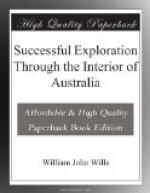I am, sir,
In the most heartfelt sorrow,
Yours very truly,
W.B. RODIER,
Town Clerk.
. . .
A proclamation in a supplement to one of the Melbourne Gazettes, towards the end of November, announced that the Governor, with the advice of the Executive Council, had directed that the portions of Main-street, Ballaarat East, lying between the Yarrowee River and Princess Street, shall hereafter be designated Wills Street, in memory of the companion of Burke.
The two following letters, written by Devonians settled
in
Victoria, appeared in the Totnes Weekly Times:—
Batesford, Geelong, 25th November, 1861.
Dear sir,
I have sent you by this mail the sad history of poor Burke and Wills, which I am sure will be read with painful interest by all your fellow-townsmen. The Melbourne papers have been very severe on the Exploration Committee, and it was my intention to have sent you copies of the Argus, from 4th to 9th November, but they cannot now be procured at any price. My brother will lend you his, if you desire it.
Nothing that has occurred here for many years has thrown such a gloom over the whole of the Australian Colonies. We are generally, perhaps, a cold, unfeeling people, but there are few whose hearts have not been touched by this sad event.
It is scarcely possible that you, accustomed as you are to the green pastures, the shady lanes, and crystal springs of dear old Devon, can realize to the full extent the sickening hardships they had to endure, or the cruel disappointment under which even they at last gave way. I cannot conceive a situation more heartrending than theirs must have been on their return to Cooper’s Creek, to find the depot abandoned. They had succeeded in accomplishing the glorious feat which so many brave men had tried in vain to accomplish; they had endured hardships which might make the stoutest heart quail; they had returned alive, but footsore, worn out and in rags, to where they might have hoped for help and succour; they were on their way to where honour and glory, well and nobly earned, awaited them; and now they must lie down in the dreary wilds of an almost unknown country, and die that most horrible of all deaths, starvation, They must have felt, too, that, worse than even this death itself, the fruits of their labours would, in all probability, perish with them, their fate remain unknown, and the glorious page of the world’s history which they would have written would be buried in oblivion, and all this—all this because
‘Some one had blundered.’
It has been decided that the remains are to be brought to Melbourne and have a public funeral. Monuments are also to be erected to the memory of the brave fellows:—
“These come too late,
and almost mock whom they are intended
to honour.”




